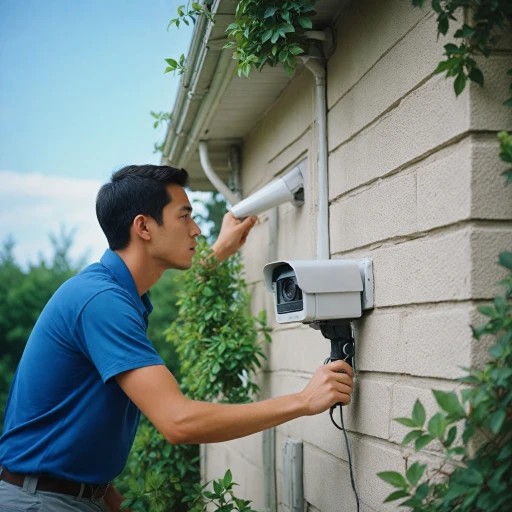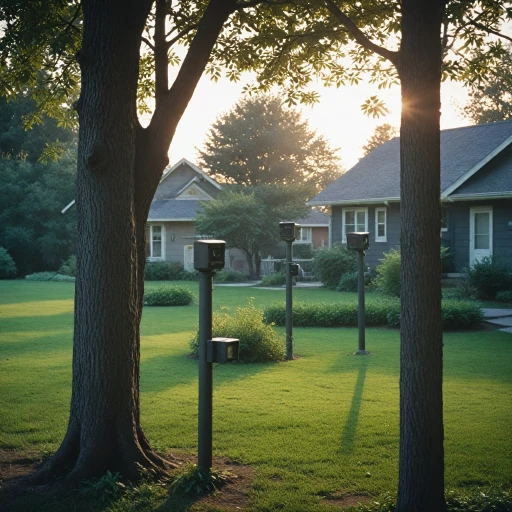
Understanding Cameras Without Wi-Fi
Exploring the Basics of Non-Wi-Fi Security Cameras
In today's tech-driven world, the idea of a security camera without Wi-Fi might seem a bit unconventional. However, these cameras offer unique advantages for those seeking a reliable security solution without the need for an internet connection. Understanding how these cameras work is essential for making an informed decision about your home security system.
Non-Wi-Fi security cameras operate independently of your home network, meaning they don't rely on a Wi-Fi connection to function. Instead, they use alternative methods to store and transmit video footage. This can be particularly beneficial in areas where Wi-Fi coverage is spotty or non-existent. These cameras often utilize local storage options like SD cards, or they might connect to a cellular network using a SIM card for data transmission.
One of the key features of these cameras is their ability to function without the internet. This means that even if your internet goes down, your security system remains operational. Many of these cameras are battery-powered, making them ideal for outdoor use or in locations without easy access to power outlets. They can also be part of a wireless security system, providing flexibility in placement and installation.
For those interested in enhancing their home security setup, integrating battery-powered motion sensor spotlights can complement non-Wi-Fi cameras by providing additional lighting and deterrence.
As you delve deeper into the world of non-Wi-Fi security cameras, you'll discover a range of options and features that cater to various needs and preferences. Whether you're looking for night vision capabilities, local storage solutions, or a system that works seamlessly without an internet connection, there's a camera out there for you.
Advantages of Non-Wi-Fi Cameras
Benefits of Using Non-Wi-Fi Security Cameras
Non-Wi-Fi security cameras provide a unique array of advantages for individuals looking to secure their homes without relying on internet connections. These types of cameras offer the flexibility of going "off the grid," which can be particularly appealing for those living in areas with limited or unstable Wi-Fi coverage or for users who prioritize privacy and prefer to keep their systems disconnected from any internet source. One significant benefit of using security cameras that work without Wi-Fi is the increased security and privacy. When a camera operates without an internet connection, the footage remains safe from potential online hacking threats. This makes them an excellent choice for those who are concerned about cyber security. Data is stored locally, often on a microSD or sim card, minimizing risks associated with online breaches. Moreover, many non-Wi-Fi security camera systems are portable. Battery-powered options offer ease of placement, ensuring that users can set them up in preferred locations without the constraints of wiring or the need for an electrical outlet. This flexibility is particularly useful for outdoor cameras, allowing homeowners to seamlessly monitor any area without extensive installation challenges. A battery life that supports long-duration usage further enhances their appeal. These battery-powered options often feature local storage solutions, which means they can work effectively without requiring continuous or frequent recharge cycles. Although lacking direct cloud storage capabilities, non-Wi-Fi cameras typically offer robust local storage options. This helps capture video footage and securely retain it on-site, offering peace of mind by shortening the chain of data storage for enhanced security. Additionally, modern advancements have introduced wireless cameras with night vision, ensuring continuous surveillance regardless of the time of day. Night vision capabilities ensure these cameras can effectively capture clear video footage even in low-light conditions. Ultimately, security cameras without Wi-Fi provide a remarkable balance of privacy, portability, and effectiveness, making them an excellent option for various security needs.Challenges and Limitations
Real-Life Challenges and Limitations
For those considering security cameras that operate without an internet connection, it's important to be aware of certain challenges and limitations that come with these systems. One of the primary challenges faced with non-Wi-Fi cameras is the limited remote access to footage and real-time video. Without a wifi or cellular connection, users may find it difficult to view live streams or receive instant alerts on their phone, which can be a crucial feature for many homeowners. Another essential consideration is the storage capacity. Cameras without wifi often rely on local storage solutions such as microSD cards. While this avoids the potential vulnerability of cloud storage, it also means that the amount of video footage that can be stored is limited to the capacity of the card. Therefore, managing and regularly checking the stored data becomes a necessary task to ensure the system is functioning optimally. Battery life presents another hurdle. Battery powered cameras without an internet connection typically need regular recharging or battery replacement. This can be inconvenient, especially for outdoor cameras placed in hard-to-reach areas. Wireless cameras with long-lasting batteries can mitigate this issue but can also come at a higher cost. Users may also face limitations in terms of integration with other home security systems. Wifi security systems often feature an app that connects different devices through a unified interface, providing a seamless monitoring experience. Cameras without internet may not support such integrations, requiring users to manage multiple systems separately. For outdoor security, night vision capabilities are crucial, but these systems may see a reduction in overall quality or functionality when without an internet-enabled app or cloud-based processing power. The quality of video footage may differ significantly depending on the system selected. For more insight into different options available and ensuring your home is protected effectively, you might consider the benefits of POE cameras for home security, which offer a sturdy alternative that can overcome some of these limitations. By understanding these challenges, users can choose the best security cameras for their needs and ensure effective home protection even without relying on a wireless connection.Types of Non-Wi-Fi Security Cameras
Exploring Various Types of Offline Home Security Cameras
When considering increasing your home’s security without depending on a Wi-Fi connection, it's essential to explore the range of available security cameras that operate independently of an internet connection. Here’s a breakdown of types of non-Wi-Fi security cameras to help guide your choice:- Battery-Powered Cameras: Some cameras are designed to be completely wireless and operate on batteries, making them perfect for areas where power sources are not readily available. They are easy to install and maintain, and since they do not require an internet connection, they are secure and resistant to hacking attempts.
- Cellular Security Cameras: These cameras use a sim card to transmit data over a cellular network rather than Wi-Fi. This feature is invaluable for remote areas where traditional internet connections are unreliable. While these cameras are more versatile, be sure to consider cellular data costs when utilizing them.
- Local Storage Cameras: Many security cameras offer local storage options like SD cards or hard drives, allowing for video footage to be stored directly on the device. This method ensures that you maintain control over your data without relying on cloud storage services.
- Wired Cameras: These require a direct power source but can be incredibly reliable and deliver uninterrupted video capture. Perfect for those who don’t mind visible wiring or permanent fixture, they provide consistent power and stability.
Installation and Maintenance Tips
Installing Your Non-Wi-Fi Security Camera System
When setting up a security camera without Wi-Fi, taking the right installation steps ensures it works effectively and efficiently. These cameras offer reliable surveillance options without the need for an internet connection. Here are some key tips to guide you through the process:
- Choose the Optimal Location: Placement is crucial. Evaluate areas that need the most coverage, both indoor and outdoor, to ensure the best view and optimize night vision. Consider factors such as lighting and potential obstructions.
- Secure the Mounting: Use durable mounting gear appropriate for the camera’s location, be it on walls, ceilings, or other surfaces. Ensure it is firmly attached to prevent damage from the elements or tampering.
- Power Your Camera Efficiently: If using battery-powered cameras, ensure they are fully charged before installation. Regularly check battery levels, or if feasible, opt for models with solar charging options for continuous power.
- Check Your Storage Options: Set up local storage solutions, such as SD cards, to ensure your footage is saved. Many cameras work without cloud storage, significantly reducing subscription costs.
- Test Your Camera System: After installation, verify the camera's angles, visibility, and recording functions. Ensure that the camera's wireless functionality (if applicable) syncs correctly with any monitoring devices without requiring Wi-Fi.
Regular maintenance is crucial for the optimal performance of your cameras. Routinely clean the lenses, check for software updates, and ensure that any wiring is intact if applicable. By following these guidelines, you can maximize the effectiveness of your security camera system without the need for internet connectivity.
Choosing the Right Camera for Your Needs
Decoding Your Security Needs
When selecting a home security camera without wifi or internet, it's crucial to consider various factors that align with your specific needs. Assess the areas you wish to monitor and determine whether you need indoor or outdoor security cameras. Outdoor cameras, for instance, require more durability and often benefit from features like weatherproofing and night vision, essential for maintaining vigilance around the clock.
Evaluating Key Features
Non-Wi-Fi cameras come with diverse features which you should scrutinize. For example, some cameras work without internet by utilizing local storage such as a SIM card or a memory card to store footage. Others might rely on cellular security systems for remote monitoring. Consider whether a battery powered option is suitable for your setting, especially if wiring is impractical. Wireless cameras provide flexibility in placement, though ensure that the battery life aligns with your expectations. For those prioritizing crisp quality, look for options providing high-resolution video capture.
Considering Connectivity and Storage
While these cameras function without constant internet connection, consider how you wish to access video data. Do you prefer local storage, where footage is kept on a memory card? Or you might opt for a system with cellular capabilities, enabling offsite storage with limited cloud storage options.
Budgeting Wisely
With varied price points, it's essential to set a budget that reflects your security needs without compromising on efficiency. Explore different brands and models, perhaps on platforms like Amazon, to compare prices and reviews. Balance your expenditures between initial purchase and potential ongoing costs, such as SIM card plans for cellular connectivity.
Leveraging Expert Reviews
Before making a purchase, dive into expert reviews and resources to ascertain which models are rated the best in specific criteria. This step can help in understanding how different cameras work and identifying the security system best suited for your home requirements.
}











